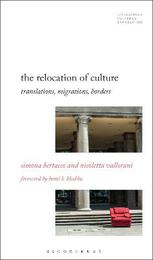
|
The Relocation of Culture: Translations, Migrations, Borders
Hardback
Main Details
Description
The Relocation of Culture is about accents and borders-about people and cultures that have accents and that cross borders. It is a book that deals with translation and nomadic identities, and with the many ways in which the increasing relevance of forced migrations has affected the practice of languages and the understanding of cultures in our times. Simona Bertacco and Nicoletta Vallorani examine the theoretical and practical nexus of translation and migration, two of the most visible and anxiety-producing keywords of our age, and use translation as the method for a global cultural theory firmly based in the humanities, both as creative output and interdisciplinary scholarship. Positioning their work within the field of translation studies with important borrowings from literary and cultural studies, visual and migration studies, the authors suggest a theory of translation that makes space for complexity, considers different "languages" (words, images, sounds, bodies), and takes into account both our emotional, pre-linguistic and instinctual reaction to the other as an invader and an enemy and the responsibility for the other that lies at the heart of translation. This process necessarily involves a reflection on the location and relocation of cultures in contemporary times.
Author Biography
Simona Bertacco is Associate Professor of Comparative Humanities and Director of Graduate Studies in the Humanities at the University of Louisville, USA. Her research focuses on postcolonial literatures in English, with special attention to issues of translation, gender, and poetics. Her most recent publications include: Language and Translation in Postcolonial Literatures (2014) and the special issues of The New Centennial Review: Translation and the Global Humanities (2016) and Altre Modernita: Disrespected Literatures: Reversals of Linguistic Oppression (2019). Nicoletta Vallorani is Professor of English Literature and Cultural Studies at the University of Milan, Italy. Her lines of research mostly combine the fields of visual studies and postcolonial studies, with references to film studies. She has recently published on migration in the Mediterranean Sea (Nessun Kurtz: Cuore di tenebra e le parole dell'Occidente, 2017; Forms of Loss: Dead Bodies and Other Objects, 2018), the intersections between crime fiction and migration studies (Postcolonial Crime, 2014), and the literary representations of the urban margins (Millennium London: Of Other Spaces and the Metropolis, 2012).
ReviewsThe book successfully articulates translation as a vital principle of our cultural life and as an act of locating ourselves in the world by acknowledging at the same time the plurality of our languages and the complexities of our migratory processes. * Iperstoria * In this timely volume, Simona Bertacco and Nicoletta Vallorani approach the relationship between translation and migration from an original perspective. Building on scholarship in translation studies, world literature and postcoloniality, they discuss translation as both a practice and an interpretative tool or mode of reading. Their examination of contemporary literary and artistic production from the US and the Mediterranean offers illuminating insights on translation as a 'border discipline' and also on the crucial role occupied by the global humanities within contemporary education. * Loredana Polezzi, Alfonse M. D'Amato Chair in Italian American and Italian Studies, Stony Brook University, USA * In this passionate and illuminating dialogue across continents, displacement is a haunting theme. The authors track the migration routes that scar today's globe, showing how these are also paths of language. * Sherry Simon, Distinguished University Research Professor, Concordia University, Canada, and author of Translation Sites: A Field Guide * The Relocation of Culture makes a bold and mature move at the border between languages and places. It hovers there, demonstrating that language itself is strange, precarious, even the "native" languages that seem natural to people who are unfriendly to migration. But Bertacco and Vallorani show that the nature of language is artifice; people on the move know that. It is available for translation, for new accents, and cohabitation with alternative codes. Nativist skeptics should brace themselves before reading; they are in for a certain change of heart. * Doris Sommer, Director of Cultural Agents Initiative, Harvard University, USA * Crossing a border often implies an existential risk, as migrants in the Mediterranean Sea and elsewhere in the world know even too well. But it is also a potentially productive act, which relocates bodies and cultures. Employing the theoretical angle of translation, Simona Bertacco and Nicoletta Vallorani work upon this productive dimension of border crossing and migration, both literally and metaphorically, foreshadowing the emergence of a vernacular cosmopolitanism. Working the boundaries of migration, translation, cultural, and postcolonial studies they open up new continents for research as well as for cultural and political activism. * Sandro Mezzadra, Professor, Universita di Bologna, Italy *
|